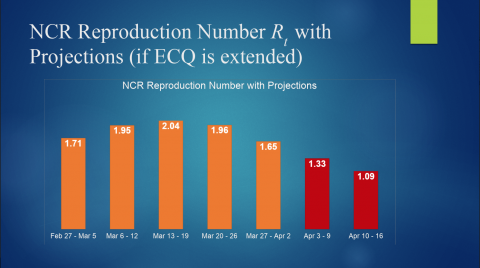by Emily Manuel
Contributor

(Eagle News) — OCTA Research supports the position of the Department of Health to extend the lockdown in the NCR+ bubble for an additional week, from April 5 to 11, 2021. They say that “a one-week ECQ is insufficient to reverse the surge and will only further strain our hospital system.”
OCTA also recommends extending the ECQ to an additional third week if the reproduction number does not dramatically drop in the next seven days. The goal is to reduce the reproduction rate to less than 1.
OCTA fellows Professor Ranjit Rye, Professor Guido David, Dr. Nicanor Austriaco, and Dr. Michael Tee, M.D. presented their findings in a virtual press conference held last April 3, 2021.
– ECQ effective in reducing reproduction number –

The implemented ECQ for March 29 to April 4 was effective in reducing the reproduction number R from greater than 2 to 1.64, with the R expected to decrease further to around 1.5 by April 4.
However, OCTA explains that since the rate of reproduction is still greater than 1, cases will continue to rise and hospitals will remain overwhelmed if the lockdown is lifted prematurely.
OCTA’s projections show that the reproduction number will still be greater than 1 by April 4. However, if the ECQ is extended to April 16, the number will drop significantly to 1.09 and will have no further movement after that.
Dr. Austriaco explains, “we expect to know the full effect of the ECQ lockdown around April 7, which is 5-7 days after NCR mobility dropped to 77% below baseline.” He compared the mobility trends in the NCR and put forward some modeling assumptions on the average time spent by patients in hospital.
On average, he found that patients are admitted 7 days after date of onset/symptoms, patients who die spend 10 days in hospital, and patients who survive spend 27 days in hospital. Based on these data, the forecast is that hospitals in the NCR will remain at critical occupancy for at least a month after a two-week ECQ that ends in the middle of April.
– OCTA recommends –
– That the national government establish an exit strategy from the ECQ that will sustain the anticipated drop in the R. They recommend that the ECQ be followed by an MECQ before returning to a GCQ.
– That the national government consider transporting health workers from low-risk regions to the NCR to assist their colleagues in the ongoing surge.
– That the national government and LGUs accelerate their efforts to build isolation and quarantine facilities where mild and recovering COVID-19 patients can be cared for, to alleviate the pressure on hospitals.
– That vaccination efforts focus on NCR+, especially among health care workers. The ongoing vaccination schedule, they say, may be insufficient to impact the ongoing surge in NCR, since it requires that 10 million people in NCR+ be vaccinated by April. However, it will help prevent a future surge.
– That ayuda or financial support be given to our poorest countrymen considering the huge economic burden that a gradual exit from the ECQ will entail.







